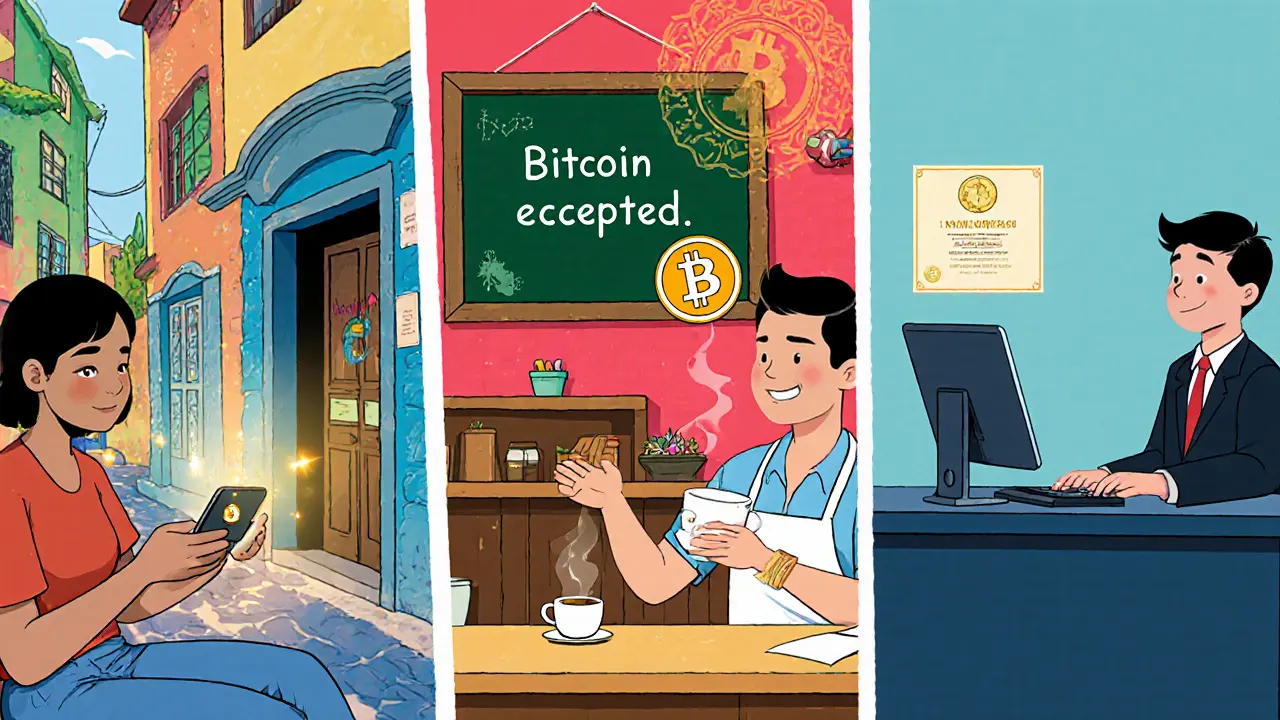 Jul, 19 2025
Jul, 19 2025
When you hear the word "Cuba" and "cryptocurrency" together, you probably picture a total ban. In reality, the island has taken a very different road. Since August 2021 the Cuban government has officially recognized digital assets and set up a licensing system that lets businesses accept Bitcoin, Ethereum and even newer coins. Below is the full picture - from the law itself to what everyday Cubans are actually doing with crypto.
Key Takeaways
- Cuba moved from a legal gray area to a regulated ecosystem with Cuba cryptocurrency regulation in August 2021.
- The Central Bank of Cuba issues one‑year licenses to Virtual Asset Service Providers (VASPs) that meet AML and due‑diligence standards.
- About 1‑2 % of the population (roughly 100‑200 k people) now use crypto for remittances and online shopping.
- The regime is driven by the need to bypass U.S. sanctions, not by a tech‑first agenda.
- Future growth hinges on better internet access, education and the evolving U.S. sanctions landscape.
Cuba cryptocurrency regulation is a legal framework introduced by Resolution 215, published in August 2021, which grants the Central Bank of Cuba authority to oversee digital‑currency activities, issue licenses, and enforce anti‑money‑laundering (AML) rules. The move was a pragmatic response to decades of U.S. economic embargoes that left ordinary citizens without access to PayPal, credit cards or reliable money‑transfer services.
From Gray Area to Legal Recognition: The Timeline
- Pre‑2020: Crypto floated in a legal vacuum. Cubans used peer‑to‑peer wallets, but there were no official rules.
- August 2021 - Resolution 215: The government formally acknowledges Bitcoin and other digital assets as legal payment methods.
- April 2022: Licensing requirements for Virtual Asset Service Providers (VASPs) go into effect, with a mandatory one‑year term.
- 2023‑2025: The Central Bank renews dozens of licenses, refines AML reporting, and expands the list of approved cryptocurrencies to include Ethereum and Avalanche.
What the Law Actually Says
Resolution 215 sets out three core pillars:
- Regulatory Authority: The Central Bank of Cuba (CBC) monitors all crypto‑related activity.
- Licensing: Any entity that wants to offer wallet services, exchanges or merchant processing must obtain a CBC license. Applications are evaluated on “legality” and “socio‑economic interest.”
- Compliance: Licensees must implement AML procedures, conduct Customer Due Diligence (CDD), file Suspicious Activity Reports (SARs), and maintain transaction logs for at least three years.
Failure to meet these requirements can lead to a revocation of the license and possible fines, but there is no criminal prohibition on private individuals holding or using crypto.

Who Can Use Crypto in Cuba?
Both businesses and individuals can legally interact with digital assets, provided they respect the licensing rules:
- Businesses: Restaurants, hotels and online retailers have started accepting Bitcoin as payment after securing a VASP license. The licensing fee is modest - around 5,000 CUP (Cuban Pesos) for the first year.
- Individuals: Cubans can hold crypto in personal wallets without a license. The main barrier is internet access; only about 55 % of households have stable broadband.
- Remittance‑focused services: Some licensed VASPs partner with U.S. diaspora groups to receive Bitcoin from relatives abroad, then convert it to local CUP via peer‑to‑peer exchanges.
Real‑World Use Cases: Why Cubans Choose Crypto
Here are the three most common ways people on the island are putting digital money to work:
- Family Remittances: With U.S. sanctions blocking traditional money‑transfer services, many Cuban families receive Bitcoin from relatives in Miami or New York. The crypto is then swapped for CUP at informal rates, often yielding a better value than the black‑market dollar.
- Online Shopping: A growing number of Cuban entrepreneurs sell handcrafted goods on international platforms. Accepting crypto lets them bypass the lack of credit‑card infrastructure and receive payments instantly.
- Peer‑to‑Peer Trade: Young Cubans use Binance, KuCoin or local exchanges to buy and sell assets like Ethereum and Avalanche, treating them as both investment and a hedge against inflation.
How Cuba’s Stance Compares Globally
| Country | Legal Status | Licensing Model | Main Motivation |
|---|---|---|---|
| Cuba | Legal, regulated | CBC‑issued one‑year VASP licenses, AML‑focused | Bypass U.S. sanctions, socio‑economic access |
| China | Prohibited | None (ban enforced) | Financial stability, capital control |
| United States | Legal, federal & state regulation | FINCEN registration, AML/KYC compliance | Consumer protection, tax compliance |
| European Union | Legal, MiCA framework | EU‑wide licensing, passporting | Market integrity, investor protection |

Challenges Still Facing Cuba’s Crypto Ecosystem
Even with a clear legal path, a few hurdles keep the sector from booming:
- Internet Infrastructure: Limited bandwidth makes wallet syncing slow, and many rural areas remain offline.
- Education Gap: Few formal crypto‑training programs exist, so many users rely on informal tutorials or foreign YouTube channels.
- Regulatory Ambiguity: While the law is clear for VASPs, there is still uncertainty about tax treatment for personal crypto gains.
- Sanctions Volatility: Any shift in U.S. policy could tighten the “socio‑economic interest” rationale, threatening future licensing.
Future Outlook: Where Is Cuba Heading?
Analysts see three possible trajectories:
- Gradual Expansion: As 5G rolls out and internet access improves, more merchants will seek licenses, and the CBC may broaden the list of approved tokens.
- Policy Tightening: If U.S. sanctions intensify, the government could impose stricter reporting requirements, making compliance costlier for small operators.
- Model Export: Other sanctions‑hit nations (e.g., Iran, North Korea) might look to Cuba’s framework as a template for accessing global finance.
For now, the pragmatic approach wins - crypto is a tool to get money across borders and buy everyday goods, not a speculative fad promoted by the state.
Quick Tips for Anyone Looking to Engage with Cuban Crypto
- Check the CBC’s public register for vetted VASPs before sending funds.
- Use a hardware wallet if you plan to hold crypto long‑term; it sidesteps local exchange risks.
- Stay updated on any new AML guidelines - the CBC releases bulletins every quarter.
- Consider stablecoins (e.g., USDC) for remittances; they reduce price volatility during conversion.
Is cryptocurrency illegal in Cuba?
No. Since August 2021, crypto is legal and regulated. Private individuals can hold and use digital assets, but businesses need a license from the Central Bank of Cuba.
What licenses are required to operate a crypto business in Cuba?
A one‑year Virtual Asset Service Provider (VASP) license issued by the Central Bank of Cuba. Applicants must pass AML checks, demonstrate socio‑economic benefit, and pay an annual fee.
Which cryptocurrencies are officially allowed?
The law does not ban specific coins. In practice, Bitcoin, Ethereum and Avalanche are the most commonly licensed, but any token can be used by individuals.
How do Cubans use crypto for remittances?
Family members abroad send Bitcoin to Cuban wallets. Licensed VASPs then convert the crypto to Cuban pesos or local stablecoins, allowing recipients to spend the money domestically.
Will U.S. sanctions affect Cuba’s crypto policy?
Sanctions are the main reason Cuba embraced crypto. Any major change in U.S. policy could push the government to tighten AML rules or revisit the licensing framework, but a complete ban is unlikely while the embargo persists.
DeAnna Brown
July 19, 2025 AT 19:13Seeing Cuba actually embrace crypto feels like a punch in the gut for those who think the U.S. is the only tech leader, it’s wild how sanctions can push a tiny island into the digital money game.
Shikhar Shukla
July 20, 2025 AT 13:17While the enthusiasm is noted, it is essential to assess the regulatory framework with rigorous scrutiny; the Central Bank's licensing system, though progressive, imposes substantial compliance obligations that may deter smaller enterprises from participation.
Miguel Terán
July 21, 2025 AT 07:20The Cuban experiment with cryptocurrency is an intriguing case study that intersects geopolitics economics and technology it showcases how a nation under embargo can leverage decentralized finance to circumvent traditional barriers the legal shift in 2021 opened doors for formalized crypto activities and the licensing regime introduced a semblance of order this framework, though nascent, offers a template for other sanctioned economies the adoption rate of 1‑2 percent may seem modest but it represents a significant slice of a population constrained by limited financial services moreover the reliance on crypto for remittances highlights the practical utility beyond speculative trading as families receive Bitcoin from abroad they can convert it locally achieving better rates than the black‑market dollar the rise of VASPs indicates entrepreneurial spirit despite infrastructural challenges internet scarcity remains a bottleneck especially in rural zones where connectivity is sporadic yet the government’s intent to improve broadband could catalyze broader participation education gaps persist however with informal tutorials and foreign content locals are gradually building competence the AML requirements, while stringent, aim to align with international standards and may foster trust among foreign partners finally the volatile nature of U.S. sanctions adds an element of uncertainty; any policy shift could reshape the licensing landscape but for now Cuba’s pragmatic embrace of crypto underscores resilience in the face of economic isolation.
Shivani Chauhan
July 22, 2025 AT 01:23The detailed overview certainly clarifies many misconceptions; it is noteworthy how the licensing fees remain relatively low which could encourage more small merchants to join the ecosystem while still maintaining necessary compliance measures.
Pierce O'Donnell
July 22, 2025 AT 19:27Looks like another hype cycle to me.
Kaitlyn Zimmerman
July 23, 2025 AT 13:30If you’re thinking about sending funds to Cuba, start by checking the CBC’s public register for licensed VASPs then use a hardware wallet for long‑term storage it’ll keep your assets safer from local exchange risks.
Chris Morano
July 24, 2025 AT 07:33Great practical tip! I’ll definitely look into the register before making any transfers.
Bobby Lind
July 25, 2025 AT 01:37Interesting read, I mean, it’s wild how crypto can become a lifeline, especially when traditional banks are out of the picture, and the fact that the government actually issued licenses-who would’ve thought?
Marina Campenni
July 25, 2025 AT 19:40I hadn’t realized Cuba had a formal crypto framework until now.
Sara Stewart
July 26, 2025 AT 13:43The emergence of a regulatory sandbox for VASPs in Havana signals a paradigm shift, effectively creating a crypto‑friendly compliance layer that dovetails with AML/KYC protocols, thereby reducing friction for cross‑border digital payments.
Laura Hoch
July 27, 2025 AT 07:47That’s a vivid picture of how necessity breeds innovation, especially when sanctions force a nation to reinvent its financial arteries with blockchain.
David Moss
July 28, 2025 AT 01:50What they don’t tell you is that these licensing moves are part of a larger agenda to embed surveillance into every transaction, watch your step.
Katharine Sipio
July 28, 2025 AT 19:53I appreciate the thoroughness of the article; the clear description of the licensing process will be helpful for anyone considering entry into the Cuban market.
Deepak Kumar
July 29, 2025 AT 13:57Absolutely! For anyone looking to get involved, the key is to stay informed about the quarterly AML bulletins and keep your infrastructure ready for the next wave of internet upgrades.
lida norman
July 30, 2025 AT 09:23Wow, this is a game‑changer for Cuban families-imagine the relief when a loved one can finally send money without the usual headaches! 😊